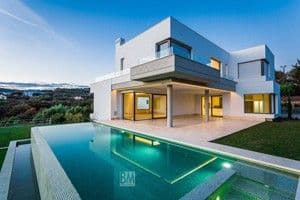The Steps to Buying a Property in Spain 2017
Step 1: Formal Offer
The process start with a formal offer being made to the seller. We always advise our clients to use a solicitor for the purchase and can recommend lawyers suitable for the transaction who speak your language.
Step 2: The Private Arras Contract – option to purchases contract
This is a simple agreement between the Buyer and the Seller in which the Seller agrees to sell the property and the Buyer agrees to buy the property at the price agreed.
The Private Arras Contract (Contrato privado de arras) will contain all the relevant details such as a description of the property, the purchase price, the payment structure and the completion date.
At this stage the Buyer will be expected to make a downpayment, which is normally paid to the Seller’s bank account and is usually 10% of the agreed purchase price.
Within the Private Arras Contract there is usually a clause stating that should the Seller decide to withdraw from the sale the Buyer is entitled to receive double the down payment as compensation and should the Buyer decide to withdraw from the sale the down payment amount is lost.
Prior to entering the contract, due diligence checks will be carried out regarding legal and technical details for the specific property.
This contract will also contain the detail of when the final purchase will complete.
Step 3: Completion of the Public Deed of Conveyance (Escritura de compraventa)
On the completion date the balance of the purchase price (sales price minus any amounts paid to date) must be paid.
The Seller and Buyer then sign the Public Deed of Conveyance (Escritura de compraventa), which is equivalent to the title deeds of the property.
The Buyer is then issued with the Public Deed of Conveyance in front of a Notary Public, who certifies the property transfer, and a copy of the Public Deed of Conveyance will be passed to the Spanish Tax Office and on to the Property Registry.
The Notary Public in Spain is a public official who is required to witness the deed of sale. However, an expert and independent legal advisor should be used to protect your own interests.
What Are the Costs Involved?
ON PURCHASE
When buying a new build property from a developer
VAT (IVA, Impuesto sobre Valor Añadido) and Stamp Duty (AJD, Actos Jurídicos Documentados) apply. VAT and Stamp Duty are applicable for residential properties that have never previously been occupied and building plots of land. VAT is a national tax that does not vary depending on the property’s location (with the exception of the Canary Islands). At present VAT is 10% of the purchase price for new residential properties (villas, apartments etc) and 21% for building plots of land. Stamp Duty is a percentage of the purchase price. This varies depending on the autonomous region where you buy, but the base rate is between 0.5% and 1.5% (e.g. in Catalonia it is 1.5%).
When buying a resale property from a private individualTransfer Tax (ITP, Impuesto sobre Transmisiones Patrimoniales) -This tax applies if it is a resale property that has been used before. The general ITP rate varies from region to region, between 6% and 10% depending on the value of the
Solicitor’s FeesIt is not obligatory by law to seek legal assistance for a property purchase but it is strongly recommended to do so. The fees can vary due to the amount of work required by the solicitor but are usually around 1% of the purchase price
Notary Public’s Fees and Land Registry Fees
The fees vary depending on the purchase price and complexity of the deed.
AFTER PURCHASE
Local Taxes (IBI, Impuesto Sobre Bienes Inmuebles)Local taxes are calculated on the cadastral value (valor catastral) of the land assigned by the Spanish Tax Office. It is advisable to ascertain annual local rates for a property before purchase as this differs depending on the region. This fee is paid annually to the town hall along with a rubbish collection fee.
Community Fees Community fees are only applicable when purchasing an apartment or a terraced house within a community of neighbours, not when purchasing a detached house. Community fees are paid monthly or quarterly and depend on the expenses of the community of the property (which may include expenses for a concierge service, lift maintenance, cleaning, gardening etc).
Non-resident Income Tax (IRNR, Impuesto sobre la Renta de No-Residentes)Non-resident income tax in Spain is paid if you are not a tax resident in Spain and applies if you own a property in Spain.
- The property is exclusively for personal use and you do not rent it out:
Although you do not earn an income from the property, in the eyes of the Spanish tax authorities you still derive a benefit from owning a property in Spain and therefore have to pay an imputed annual income tax. The base for the applicable tax rate is generally 2% of the cadastral value of the property. The cadastral value of the property is much lower than the commercial value. The tax rate is 19% for EU residents and 24% for non-EU residents. This tax usually equates to approximately 0.2% of the property value, although it varies depending on the exact circumstances.
- You rent out the property and therefore pay tax for the periods during which it is rented:
The base for the applicable tax rate is the income that you receive from renting out the property. Various costs can be deducted if you are a tax resident in the European Union. For example, possible applicable deductions include costs for property management and the maintenance of the property. If you have no other source of taxable income in Spain the tax rate is 19% for EU residents and 24% for non-EU residents.
Wealth Tax for Non-residents (Patrimonio)
Current legislation prescribes that whoever owns property in Spain (residents and non-residents alike) has to pay an annual wealth tax based on the net value of their assets in Spain after permitted deductions, such as mortgages.
The base for the applicable tax is the net value of your property and other assets in Spain (stocks, bank funds, art collection) with a large tax-free allowance. This allowance can vary between regions (e.g. in Catalonia it is €500,000 for residents and €700,000 for non-residents). The tax rate works on a sliding scale with marginal rates starting at 0.2% and rising to 2.5%. If two clients are purchasing the property the wealth tax is divided by two (e.g. €800,000 property purchase by a couple would count as €400,000 each and the tax is therefore not applicable).
Administrative Requirements
Prior to completion non-Spanish buyers will need a Spanish NIE (tax identification number) and a bank account in Spain:
- You are required to obtain a Spanish NIE (Número de Identidad de Extranjero), a tax identification number. The NIE can be obtained and organised through a Power of Attorney if you do not have time to attend an appointment and collect all the required documentation. It is best that you do this at the very beginning of your property search to avoid unnecessary delays or missing out on specific properties further along in the process.
- A Spanish bank account is required to administer all payments. Bear in mind that the Spanish bank will need you to provide documents that certify the origin of the funds you will be using for the purchase, so try to make sure you find out as early as possible about your bank’s exact requirements.
This is a basic guide researched from various sources -we recommend you speak with a lawyer if you require more clarity on any of the points stated above
Teilen

Sabina Falconer
Immobilienspezialist
In Südafrika geboren und in den lebendigen Gemeinden von Gibraltar und Sotogrande aufgewachsen, hat Sabina die Immobilienbranche im Blut. Sabinas Engagement, die individuellen Bedürfnisse und Wünsche jedes Kunden zu verstehen, stellt sicher, dass jede Immobilien-Transaktion mit Präzision und Sorgfalt durchgeführt wird.

